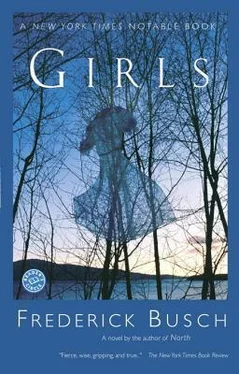I came halfway down the aisle to stand under the low ceiling made of tin plates with designs on them, and I tried to imagine what the Tanners said and thought when they were here. I tried to sense their comfort but couldn’t. I closed my eyes and tried to hear Mrs. Tanner’s voice. I felt a pulse beating in my ribs, I thought. Something, surely, was banging away inside in that vicinity. I tried to hear Mrs. Tanner praying. I tried to hear Janice. I had never heard her voice. I didn’t think I would.
Dear God, I thought, keeping my eyes closed. I thought of men I’d known in the service who prayed. They had prayed at bad times, I thought, and maybe to someone religious their prayer would seem selfish, tainted by all their need. A lot of American servicemen beat up whores. They were exhausted, frightened men, and their experience was mostly of loss. They lost girlfriends and wives at home. They lost money over there, and they lost face. They lost some battles, though they won some. They couldn’t tell because everything was measured in killed bodies and we told them they outkilled the enemy, but the real estate they’d thought to gain was either given back or retreated from because goals and strategies were changed at the level of command. So they felt like losers. And they lost their friends. Men died in terrible ways, of course, and they saw them die, and no one told them how to mourn or gave them time or occasion. Men they loved were torn to pieces and everyone was slicked with their blood and no one stopped a minute to say their sorrow for them. And some of them cut up girls in the bars and brothels. They beat them badly. And we arrested them after viewing the crime scene. And one of us was always saying, “My God,” or “Dear God,” or “Jesus Christ.” I think we might have meant something , but I never knew what, and I couldn’t feel what this building was for.
I said her name to myself, but not out loud.
Then I said it out loud, to hear it against those ceiling plates, maybe three feet over my head. I listened to its two syllables bounce back down.
A low voice whispered, off to my left and behind me, “Who’s that?”
I wheeled, and of course my ribs hurt badly. I made some kind of noise and then I said, when I saw her, “Mrs. Tanner. Damn. Excuse me. I was thinking about you, all of you.”
“Who’s Hannah?” she said. “You were saying her name.”
“No,” I said, “Janice.”
“You said Hannah.”
“I did?”
I saw a motion, and I went to where she sat, in the farthest left-hand folding chair in the church. Her orange-yellow face was gaunt. She wore a coarse gray blanket wrapped around her, over her coat.
“It’s so cold in here,” she said. “I don’t know why. We pay a fortune for fuel oil, but it doesn’t warm up.”
I said, “I was coming to see you. I was going to your house after this.”
“You didn’t know I was here?”
“No.”
“Then isn’t that a wonderful sign,” she said. “We’re in tune with each other.”
She shivered, and I went to one of the old-fashioned iron radiators at the wall and I touched it. Part was cold and part was warm. I followed the wall, feeling the radiators that were placed every ten or fifteen feet. When I got to the one at the back, where its water pipe entered the floor, I asked her, “Do you keep any tools here?”
“In the back, maybe. In an old hutch near the desk.”
I saw its shape, so I didn’t turn lights on. I found the wrench on a shelf, along with two hammers, a long screwdriver, a short one with a Phillips head, and a rasp. I tried to figure why they’d need a wood rasp in a church. The wrench was the right size. I thought the Reverend B. Tanner would have used it, but he forgot. He wasn’t thinking of radiators. Back in the church, I fought my way as quietly as I could to my knees, and I used the wrench on the valve. The air hissed out, and a little rusty water, and then I shut it off. The radiator jumped a little. It took me half an hour to do the others. It got more difficult, each time, to get down and then up. Once, I spilled a little too much water out. I pulled myself up on the last radiator I’d bled, and then I went over to her, still holding the wrench, and I leaned against the wall to her left.
“Aren’t you a miracle worker,” she said.
I said, “No. If I could do miracles, I’d have brought your daughter back. Mrs. Tanner, I haven’t found anything. I read the state police reports, I talked to deputies and troopers and some local police. I found two or three people to scrutinize, I guess you’d call it. I tried very hard to suspect them. I don’t think they’re involved. I don’t know a thing.”
“You warmed the church up,” she said. Then, her voice dropping even lower, harsher, she said, “Who are the ones you suspected?”
I shook my head.
“I suppose you’re right,” she said. “I don’t have too much more time to wait. Do you understand?”
I stared at her. It had been a pretty face, and I tried to find Janice in the tight, stained skin. She was waiting, and I finally said, “Yes.”
“Good,” she said. “Oh, didn’t you make the church warm. ” And then she said, “So we all believe she was taken away. A distance away.”
“It’s often the case,” I said.
She moved her head. “Imagine,” she said, “it happens enough — little children are stolen into, I don’t know, are seized and taken — so you can say the word often about it.”
“I’m sorry.”
“Will we find her?”
I shrugged, then winced, because I had moved my shoulders and therefore my ribs too hard.
“What?” she said.
I said, “Nothing.”
“Will we ever find her, Jack?”
I almost said God knows. I almost said By accident, maybe. It was all about accidents, one and then another. I said, “Competent people are working on it.”
“Yes,” she said. I shifted my legs. She said, “And who is Hannah?”
The tin ceiling tiles were machine-pressed into sunburst shapes, but sunbursts made of straight lines and right angles. There was nothing round on the design that was repeated on tile after tile. Each of them was held in place with nails, I thought, and the nails were rusted. I figured they had hammered up into lath or cheap, unfinished firring strips. The radiators were chugging now, and there was plenty of heat. Mrs. Tanner kept the blanket around her, though, and I saw her mouth move slowly against the pain. And here I was, the burly fix-it guy from security, doing nothing for anyone but harm. Mr. Interrogator, I thought, who can’t find anyone to interrogate. I was nagged by something at the bottom of my thoughts, and I couldn’t find it. Probably some C-4 on a fuse that Fanny had planted for me.
Mrs. Tanner said, “Jack?”
I thought, You can give her that.
I thought, No, you can’t.
I reached into the blanket, and I found her broad, cold, weightless hand. I squeezed it.
“What did you do to your hand? You can at least tell me that.”
“Hooligans on campus,” I said. “They showed me what-for. My father always called it that when someone took a beating: They got what-for.”
“Are you in pain?”
I squatted in front of her, instructing my ribs to stay out of this. I said, “ You’re asking anyone else about pain.”
“Don’t you talk like that to me, Jack. Don’t you make me into some hero. I’m a middle-aged woman with cancer and no more child. That’s no hero. God, maybe, is the hero. God makes the plan.”
I said, “Maybe Janice is a hero, too, though. Since nobody consulted her about the plan.”
Her face collapsed.
It seemed to me I had done more than enough damage. I squeezed her hand again, I made my body rise without too much drama, and I told her, “Mrs. Tanner, kids come back. Sometimes they run away and sometimes they come back. Sometimes they get stolen and they escape and come home. But sometimes, they, you know, don’t. I couldn’t be telling you anything new. You must have thought about this so much—”
Читать дальше










